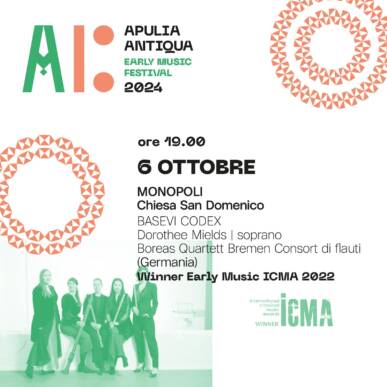
Chiesa Rettoria San Domenico di Guzmán
Monopoli,via San Domenico 49
70043
Italia
Monopoli,via San Domenico 49
70043
Italia
Organizzatore
Sentieri Armonici
Dorothee Mields, soprano & Boreas Quartett Bremen
Dettagli evento
Music at the Court of Margaret of Austria
Il Codice Basevi ci riporta alla stagione d'oro della scuola polifonica fiamminga, fiorita nelle terre delle Fiandre a partire dal Quattrocento e rimasta in auge fino al principio del XVII secolo; i suoi più grandi maestri - da Dufay a Ockeghem, da Desprez a Willaert, da Lasso a Sweelinck - hanno saputo dare forma e sostanza a un'arte estremamente raffinata e complessa, caratterizzata da una fantasia creativa e da una ricchezza espressiva davvero straordinarie. Il programma riunisce una selezione significativa di brani tratti appunto da questo importante manoscritto, che è stato realizzato all'inizio del XVI secolo a Mechelen nell'ambito della corte di Margherita d'Austria (unica figlia dell'imperatore asburgico Massimiliano I e della duchessa Maria di Borgogna) e che raccoglie 87 opere tra chansons e mottetti in francese, olandese, latino e italiano. Il volume deve il suo nome attuale al collezionista Abramo Basevi, che nel corso dell'Ottocento ha acquistato il codice e lo ha donato al Conservatorio di Firenze.
Dorothee Mields - Soprano
Elisabeth champollion, Julia Fritz, Jin-Ju Baek, Luise Manske - Renaissance Recorders
Anonymous
Johannes Ghiselin (1455 – 1511) Pierre de la Rue (1452 – 1518)
Jacob Obrecht (1457 – 1505)
Pierre de la Rue
Pierre de la Rue
Loyset Compère (1445 – 1518) Anonymous
Antoine Brumel (1460 – 1512) Johannes Ockeghem (ca. 1420 – 1497) Matthaeus Pipelare (1450 – 1415) Pierre de la Rue
Anonymous
Alexander Agricola
Johannes Prioris (1460 – 1514) Johannes Prioris
Pierre de la Rue
Heinrich Isaac (1450-1517)
Ave Maria gracia plena
Fors seulement (instrumental)
Plores gemier crier/Requiem aeternam Requiem (instrumental)
Il viendra le jour désiré
Puisque je suis hors du compte Scaramella fa la galla
Amour m’on fait de desplaisier
James que la (instrumental)
Fors seullement à 3
Fors seullement (instrumental)
Fors seullement
Ave Maria gratia plena
Sonnes muses melodieusement à 3 Deuil et ennuy/Quoniam tribulatio Royne du ciel/Regina celi
Ma bouche rit (instrumental)
La mi la sol
Bright as a bell and angelic: these are the attributes that come to mind when listening to Dorothee Mields' voice. Without much fanfare, she has sung her way into the first rank of European baroque sopranos. She has performed and recorded Bach's cantatas, the Christmas Oratorio and the two great Passions with early music specialists such as Philippe Herreweghe and the Collegium Vocale Gent or the ensembles of the J. S. Bach Foundation under Rudolf Lutz. In addition to Bach, Dorothee Mields is also enthusiastic about other Baroque composers such as Graupner, Telemann, Purcell, Handel, Schütz and Monteverdi, as well as Renaissance music. She has an intensive collaboration with the lautten compagney Berlin, with whom she has presented thematic programs on English baroque music, Monteverdi and music reflecting the events of the war from 1618 to 1918. Dorothee Mields is also involved in contemporary music, for example at the Munich Biennale and with Klangforum Wien.
Since its foundation in 2008, the Boreas Quartet Bremen has dedicated itself to the core repertoire of the recorder quartet: music from the Renaissance and modern times. The ensemble has an instrumentarium of over 40 recorders of various types and sizes, including a twelve-piece Renaissance consort by Peter van der Poel, built from original 16th century instruments.
In 2023, a recording was made with music by Markus Schönewolf and an early baroque ricercar cycle by Alessandro Poglietti. The first CD with Dorothee Mields - BASEVI CODEX (2021) - was awarded the International Classical Music Award (ICMA) in the Early Music category.
Concert tours have taken the Boreas Quartet Bremen to Musikfest Bremen, the MDR Musiksommer, the Boston Early Music Festival and Music Before 1800 New York (USA), Musica Antica Urbino (Italy), Taiwan International Recorder Festival, Concentus Moraviae (Czech Republic) and AMUZ Antwerp (Belgium). The four musicians have been praised in the press for their "mastery of sound" (Saarbrücker Zeitung), their "lively, great expressiveness" (Kreiszeitung Wesermrasch) and their "outstanding technique, perfect intonation and incredible precision in playing together" (Göttinger Tageblatt).
Jin-Ju Baek, Elisabeth Champollion, Julia Fritz and Luise Manske studied recorder with Prof. Han Tol at the Bremen University of the Arts from 2004 to 2009.
www.boreas-quartett.de

